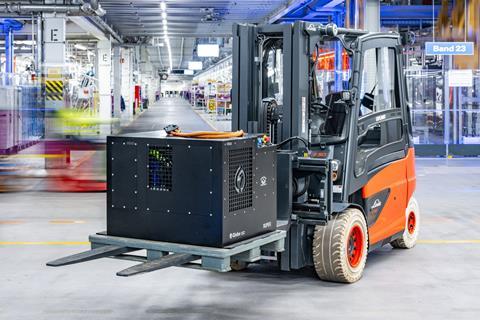As part of its sustainability efforts, BMW will transition its in-plant logistics at Regensburg to hydrogen fuel cell technology, powering its tugger trains and forklift trucks. This move, under the iFactory initiative, aims to streamline operations and support the company’s carbon-neutral goals by reducing reliance on electric battery systems.

BMW will start using hydrogen-powered tugger trains and forklift trucks for in-plant logistics at its Regensburg assembly plant in Germany from 2026. The carmaker said it is another step toward its iFactory digital and sustainable factory initiative.
In terms of digital developments, earlier this month BMW announced it is using a cloud-based traffic control system to guide the 140 smart transport robots (STRs) and 50 tugger trains it uses to deliver parts to the assembly line at Regensburg.
Currently, all of the equipment used for parts deliveries to production at Regensburg run on electric drivetrains. The logistics fleet at the plant comprises about 230 tugger train haulers and forklift trucks. The batteries used in the industrial trucks need to be changed twice per shift. BMW said battery replacement, which is performed manually using a crane, takes about 15 minutes. The transition to hydrogen drives will be completed in stages between 2026 and 2030.
“Switching production logistics from electricity to hydrogen will diversify our plant’s energy mix – while optimising logistics processes and saving valuable space,” said project manager Katharina Radtke. “The advantage of hydrogen is that refuelling is very fast – just like with conventional fuels. The filling stations required for this will be installed directly within the different production areas and do not take up much space.”
BMW said it is installing a 2km-long pipeline network, with six decentralised filling stations at the plant, between now and early 2026. The stations will supply the logistics vehicles with hydrogen across various production areas delivered in special trailers that can also be used for interim storage. “Once the conversion is completed, our annual hydrogen consumption will be around 150 tonnes,” said Radtke.
Since 2001 BMW has also been using trucks fuelled by liquified natural gas (LNG) to deliver engines to the Regensburg plant. The use of the trucks is part of the vehicle maker’s sustainability target of making all of the cargo transport for its operations carbon neutral by 2050. Using the trucks means carbon dioxide emissions on the route are cut by up to a quarter compared to conventional diesel engines, while nitrogen oxide emissions (NOx) are reduced by up to 60%, says BMW.

























![Global[1]](https://d3n5uof8vony13.cloudfront.net/Pictures/web/a/d/s/global1_726550.svgz)













No comments yet